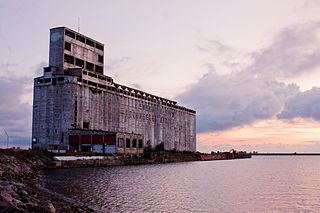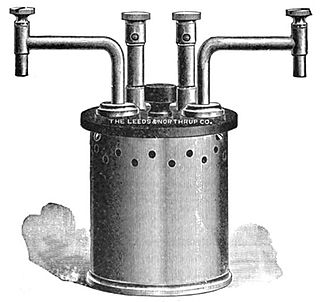Related Research Articles

A grain elevator is a facility designed to stockpile or store grain. In the grain trade, the term "grain elevator" also describes a tower containing a bucket elevator or a pneumatic conveyor, which scoops up grain from a lower level and deposits it in a silo or other storage facility.

The Church of the Nazarene is a Christian denomination that emerged in North America from the 19th-century Wesleyan-Holiness movement within Methodism. It is headquartered in Lenexa within Johnson County, Kansas. With its members commonly referred to as Nazarenes, it is the largest denomination in the world aligned with the Wesleyan-Holiness movement and is a member of the World Methodist Council.

Frank Rudolph Wolf is an American politician who served as the U.S. representative for Virginia's 10th congressional district from 1981 to 2015. A member of the Republican Party, he announced in December 2013 that he would not run for reelection in 2014. Wolf retired at the conclusion of his 17th term in office, in January 2015. At the time of his retirement, he was the dean of the state's congressional delegation, having served for 34 consecutive years.

MidAmerica Nazarene University (MNU) is a private Nazarene university in Olathe, Kansas in the Kansas City metropolitan area. It was established in 1966.
The United Kingdom is home to a widespread and diverse co-operative movement, with over 7,000 registered co-operatives owned by 17 million individual members and which contribute £34bn a year to the British economy. Modern co-operation started with the Rochdale Pioneers' shop in the northern English town of Rochdale in 1844, though the history of co-operation in Britain can be traced back to before 1800. The British co-operative movement is most commonly associated with The Co-operative brand which has been adopted by several large consumers' co-operative societies; however, there are many thousands of registered co-operative businesses operating in the UK. Alongside these consumers' co-operatives, there exist many prominent agricultural co-operatives (621), co-operative housing providers (619), health and social care cooperatives (111), cooperative schools (834), retail co-operatives, co-operatively run community energy projects, football supporters' trusts, credit unions, and worker-owned businesses.

A consumers' co-operative is an enterprise owned by consumers and managed democratically and that aims at fulfilling the needs and aspirations of its members. Such co-operatives operate within the market system, independently of the state, as a form of mutual aid, oriented toward service rather than pecuniary profit. Consumers' cooperatives often take the form of retail outlets owned and operated by their consumers, such as food co-ops. However, there are many types of consumers' cooperatives, operating in areas such as health care, insurance, housing, utilities and personal finance.

The ohm is the unit of electrical resistance in the International System of Units (SI). It is named after German physicist Georg Simon Ohm. Various empirically derived standard units for electrical resistance were developed in connection with early telegraphy practice, and the British Association for the Advancement of Science proposed a unit derived from existing units of mass, length and time, and of a convenient scale for practical work as early as 1861.

Cooperative banking is retail and commercial banking organized on a cooperative basis. Cooperative banking institutions take deposits and lend money in most parts of the world.
The World Intellectual Property Organization's Protection of Broadcasts and Broadcasting Organizations Treaty or the Broadcast Treaty is a proposed treaty designed to afford broadcasters some control and copyright-like control over the content of their broadcasts.
The history of the cooperative movement concerns the origins and history of cooperatives across the world. Although cooperative arrangements, such as mutual insurance, and principles of cooperation existed long before, the cooperative movement began with the application of cooperative principles to business organization.
Parbati Sankar Roy Choudhury, (1853–1918) was the zamindar of Teota and a philanthropic landholder.

The Saskatchewan Wheat Pool was a grain handling, agri-food processing and marketing company based in Regina, Saskatchewan. The Pool created a network of marketing alliances in North America and internationally which made it the largest agricultural grain handling operation in the province of Saskatchewan. Before becoming Viterra, SWP had operated 276 retail outlets and more than 100 grain handling and marketing centres. The Saskatchewan Wheat Pool operated under the name of AgPro in the prairie provinces of Manitoba and Alberta. Begun as a co-operative in the 1920s, the company became a publicly traded corporation in the 1990s. After the 2007 takeover of its competitor, Winnipeg-based Agricore United, the Pool name was retired. The merged company operated under the name Viterra until 2013, when it was acquired by Glencore International.

Salina High School Central, often referred to as Salina Central, is a fully accredited public high school located in Salina, Kansas, serving students in grades 9-12. The school was known as Salina High School before the opening of Salina High School South in 1971. Located at 650 East Crawford in the city of Salina, the school is attended by Salina USD 305 students living north of Republic Avenue. The athletic programs compete in the Ark Valley Chisholm Trail League of the 5A division according to the KSHSAA. The Salina High School Central campus is home of the Salina Stadium.
The National Athletic Trainers' Association (NATA) is the professional membership association for certified athletic trainers and others who support the athletic training profession. Founded in 1950, the NATA has grown to more than 43,000 members worldwide. The majority of certified athletic trainers choose to be members of NATA to support their profession and to receive a broad array of membership benefits.
The International Society for the Systems Sciences (ISSS) is a worldwide organization for systems sciences. The overall purpose of the ISSS is:
Elieser Salman Posner is a specialist in Grain Science. He holds a PhD in Grain Science & Industry from Kansas State University.

Oryzaephilus mercator, the merchant grain beetle, is a small, flattened beetle about 2.5mm in length. It is a common, worldwide pest of grain and grain products as well as fruit, chocolate, drugs, and tobacco. The biology of O. mercator is nearly identical with Oryzaephilus surinamensis. It can be differentiated from O. surinamensis by its larger eyes and by the shape of the head, the area just behind the eyes of O. mercator is narrower than that of O. surinamensis, which has a more triangular shaped head. Unlike O. surinamensis, adults are capable of flight.

Manchester has historically influenced political and social thinking in Britain and been a hotbed for new, radical thinking, particularly during the Industrial Revolution.

The Saskatchewan Grain Growers' Association (SGGA) was a farmer's association that was active in Saskatchewan, Canada in the early 20th century. It was a successor to the Territorial Grain Growers' Association, and was formed in 1906 after Saskatchewan became a province. It provided a voice for farmers in their struggle with grain dealers and the railways, and was influential in obtaining favorable legislation. The association initially resisted calls to create a farmer-owned marketing company. Later it did support formation of the Saskatchewan Co-operative Elevator Company. The SGGA helped the Saskatchewan Wheat Pool, a cooperative marketing organization, to become established in 1924. In 1926 the SGGA merged with the more radical Farmers' Union of Canada, which had earlier split from the SGGA, to create the United Farmers of Canada,

The Grain Growers' Grain Company (GGGC) was a farmers' cooperative founded in the prairie provinces of western Canada in 1906. The GGGC met strong resistance from existing grain dealers. It was forced off the Winnipeg Grain Exchange and almost failed. With help from the Manitoba government it regained its seat on the exchange, and soon had a profitable grain trading business. The company founded the Grain Growers' Guide, which became the most popular farmer's newspaper in the region. In 1912 the GGGC began operating inland and terminal grain elevators, and in 1913 moved into the farm supply business. The GGGC was financially secure and owned or operated almost 200 elevators as well as 122 coals sheds and 145 warehouses by the time it merged with the Alberta Farmers' Co-operative Elevator Company to form the United Grain Growers in 1917.
References
- ↑ Tremaine, Richelle (1997-12-28). "Millers association shares skills and support Technology advancements are a major mission of group based in Leawood". The Kansas City Star. p. D2. Retrieved 2009-11-08.
- ↑ "IAOM's 2007 Tri-District Meeting Draws a Crowd to Grand Rapids, MI". GrainNet. September 17, 2007. Retrieved 2009-11-07.
- "Newly-formed Eurasia District of IAOM". AgriMarket.Info. November 23, 2006. Archived from the original on July 21, 2011. Retrieved 2009-11-07.